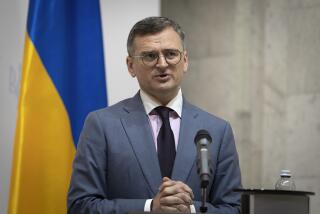Yeltsin’s New Economic Czar Quits Cabinet Post
- Share via
MOSCOW — Even before President Boris N. Yeltsin has finished putting together a new Cabinet, it is beginning to come apart.
Mikhail M. Zadornov, promoted Tuesday by Yeltsin to the key role of first deputy prime minister in charge of economic policy, resigned Friday in a move likely to embarrass the president and jolt Russia back into political tumult.
It also placed Russia’s financial future in jeopardy. Zadornov had been finance minister since September in the government of recently ousted Prime Minister Yevgeny M. Primakov. He also had been Russia’s main negotiator with the International Monetary Fund, to which the country owes billions of dollars due this year.
“Zadornov is just the first big casualty in the fiercest and most cynical power struggle that is now going on around the government,” economist Irina Y. Yasina said. “The resignation of Zadornov is very bad for the government, bad for the economy, and bad for the country and its people.”
It also was seen as new evidence of the powerful influence on Kremlin politics of “the Family”: Yeltsin’s daughter Tatyana Dyachenko; oligarch Boris A. Berezovsky, who is believed to have her ear; and oil baron Roman Abramovich, chairman of Sibneft, who is rumored to be the Family’s financial advisor.
Russian media reports have speculated that the group opposed Zadornov because he was seen as a frugal monetarist who kept a tight rein on the government’s money.
For his part, Yeltsin said nothing about the affair during a Kremlin ceremony with visiting South Korean President Kim Dae Jung. At the ceremony, Yeltsin moved stiffly and appeared bloated, despite a five-day vacation.
Little more than a week ago, Russia’s political turmoil appeared to have subsided when the lower house of parliament on May 19 gave a rousing endorsement to Yeltsin’s nominee for prime minister, loyal police chief Sergei V. Stepashin. The vote came just four days after an impeachment drive against Yeltsin failed in the Duma, the lower house.
But unlike his dealings with previous prime ministers, who were left largely alone to name Cabinet ministers, Yeltsin appears to have micromanaged the process for Stepashin.
“This indicates that Sergei Stepashin is not independent in forming the government and that puppeteers continue to control the government selection process,” said Grigory A. Yavlinsky, head of the liberal Yabloko party.
Before the latest upheaval, Stepashin was seen as an interim prime minister who would name a moderate Cabinet and guide the country until presidential elections in June 2000. Stepashin had told lawmakers he planned to keep more or less the same people who served in the Cabinet headed by Primakov.
But there was one major exception. Stepashin said publicly that he planned to name the Duma’s budget committee chairman, liberal economist Alexander D. Zhukov, to be first deputy prime minister in charge of economic policy. He said Zhukov’s main task would be to work with Zadornov as finance minister and with the Duma to pass laws demanded by the IMF before that organization will release new loans.
Yeltsin, apparently seeking to reassert control over economic policy and his new prime minister, insisted on also naming Nikolai Y. Aksyonenko as a first deputy prime minister. Aksyonenko, a former railways minister who was also considered a candidate for prime minister, is rumored to be closely allied with Berezovsky.
Stepashin apparently resisted and wound up with a compromise: Instead of Aksyonenko and Zhukov as his deputies, he would have Aksyonenko and Zadornov.
The compromise appeared to please no one. Aksyonenko insisted that he would have authority over the economy. Zadornov insisted that, on the contrary, he would be the one to control economic policy and would take the job only if he also retained the post of finance minister.
But on Wednesday, Yeltsin named Mikhail Kasyanov as finance minister, a decision that set the stage for Zadornov’s resignation.
“I told [Stepashin] that it was important for me to combine the post of first deputy prime minister with that of finance minister,” Zadornov said Friday in a TV interview. “My views were not listened to, either by the president or by his administration, and today I must resign.”
More to Read
Sign up for Essential California
The most important California stories and recommendations in your inbox every morning.
You may occasionally receive promotional content from the Los Angeles Times.













